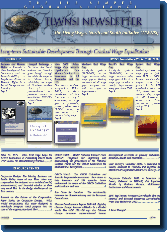 |
In this issue: - Business and Human Rights - Towards a New Paradigm of True Democracy and the Sustainability of People and Planet, or Rhetoric Rights in a Sea of Deception and Posturing;
- Unequal Exchange - On how the South endows the "North's good living" through the miniscule wages of its labour force, subsidising the wages of Northern workers through a premeditated and perverse system of exploitation. TLWNSI's raison d''etre!;
- New 2005 Living-Wage Gap Analysis Updates for Manufacturing Workers in 12 Economies and the U.S. Our annual updated analysis from 1975 to 2005, for eight developed and four "emerging" economies, of wage gaps in purchasing power parities terms (PPPs) using as benchmark U.S. manufacturing wages;
- Mexico´s Real Wage Gap - Analysis update (1975-2005) on the huge manufacturing wage gap of Mexico, the worst of all wage gaps analysed and with no signs of improvement;
- Brazil´s Real Wage Gap - Analysis update (1996-2005) on the huge manufacturing wage gap of Brazil; a wage gap showing a steady improvement every year since 2002;
- Spain´s Real Wage Gap - Analysis update on the wage gap of Spain from 1975 to 2005. Spain's manufacturing wages have lost ground in its PPP equalisation with the U.S., given that the manufacturing wages of all European economies lost purchasing power during 2005;
- Table T4: 1975 - 2005 - Real-Wage Gaps for Twelve Economies, in Purchasing Power Parity (PPP) Terms, for Manufacturing Workers;
- Corporate Design. The Missing Business and Public Policy Issue of our Time. How can corporations be designed so as to blend social, environmental, and financial mission at their very core? This is the design challenge of the 21st century;
- Summit on the Future of the Corporation. Paper Series on Corporate Design. What would corporations that were designed to seamlessly integrate social purpose into the core of the organisation look like?
- OECD Watch - Model National Contact Point (MNCP): Proposals for improving and harmonising the procedures of the National Contact Points for the OECD Guidelines for Multinational Enterprises;
- OECD Watch. The OECD Guidelines and Socially Responsible Investment. Fact sheets to help investors and SRI agencies better understand the scope of the OECD Guidelines and facilitate their use;
- Too Close for Comfort. The relationship between the biotech industry and the European Commission;
- Human Development Report 2007/08. Fighting climate change: human solidarity in a divided world. The HDR 2007/08 says that Climate change threatens unprecedented human development reversals in poverty reduction, nutrition, health and education;
- Civil Society's Calendar 2008. A Selection of Events, Relevant to TLWNSI, Put Together by Members of Organised Global Civil Society;
- Corporate Calendar 2008. A Selection of Events, Relevant to TLWNSI, Put Together Mostly by Business Groups, Multilateral Institutions and Governments;
- 2007 Top-Twenty Resource Downloads. The top Internal and External Resources Downloaded From Our Website in 2007;
- A Final Thought
TOP
BUSINESS AND HUMAN RIGHTS - TOWARDS A NEW PARADIGM OF TRUE DEMOCRACY AND THE SUSTAINABILITY OF PEOPLE AND PLANET, OR RHETORIC RIGHTS IN A SEA OF DECEPTION AND POSTURING
The good old formula of changing so that everything remains the same...!
This is a study motivated by the concern and frustration for the lack of meaningful progress in the struggle to establish a normative framework to protect human rights (HR) along the entire domain of business activity. The author, Álvaro de Regil, Executive Director of TJSGA, approaches this critical issue with the conviction that we endure an era in which, to say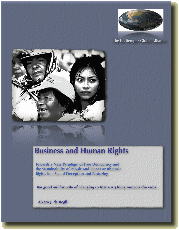 the least, a savage and perverse market ethos has been imposed upon humanity and the planet as a paradigm of life, with rules and structures designed in direct line with the conditions demanded by business for its exclusive benefit. As a consequence, societies' human rights are systematically stamped on by business activity in the name of free marketeering. the least, a savage and perverse market ethos has been imposed upon humanity and the planet as a paradigm of life, with rules and structures designed in direct line with the conditions demanded by business for its exclusive benefit. As a consequence, societies' human rights are systematically stamped on by business activity in the name of free marketeering.
This is an assessment of the debate on the responsibilities of business regarding human rights in particular, but also generally on the political, civil, economic, cultural and labour rights; an assessment that, furthermore, constitutes the position of our only initiative: The Living Wages North and South Initiative (TLWNSI), relative to business and HR. Hence, the assessment ends by proposing a new HR paradigm with respect to business, from TLWNSI'S perspective, with true democracy and real sustainability as its underpinnings. De Regil argues that, in the struggle for establishing a framework regulating the responsibilities of business in respecting HR in their environs, there is a dominant position rejecting regulating the impact of business on the enjoyment of HR through a binding framework, with no other argument but the primacy of business over people and planet. The author contends that the governments of the world and their multilateral agencies have clearly imposed, in a completely undemocratic fashion, an ethos where the market reigns supreme over people and planet. Consequently, they not only condone but enthusiastically support the systematic and customary violation of HR in business, with the payment of misery wages, vis-à-vis living wages, standing out prominently in what today constitutes a modern-day-slavery business practice; the shining feature of this era's Darwinian business culture.
Accordingly, despite the overwhelming evidence of the systematic and customary violation of HR by business, what is clearly observed is an unrelenting litany of postures and gesticulations that pretend to change to remain the same, in line with the will of the owners of the market.
Nevertheless, de Regil asserts that the last word has not been said, and that we, civil society, the common citizens of both rich and poor countries, are not letting up nor will we weaken our vigour and pace to completely and radically change the current ethos. Download the new Business and Human Rights study here!
TOP
UNEQUAL EXCHANGE
On how the South endows the "North's good living" through the miniscule wages of its labour force, subsidising the wages of Northern workers, through a premeditated and perverse system of exploitation. TLWNSI's raison d''etre! In this Brief Claudio Jedlicki* assesses economist Arghiri Emmanuel's theory of Unequal Exchange, to delve, from an economic analysis angle, into TLWNSI`'s central argument: that we endure a North-South system of exploitation, which, among other features, has a direct and premeditated impact on the misery wages paid in all countries in the South. This unequal exchange constitutes a trade imperialism that historically has generated vast earnings for the North, greater than the interests recovered by banks and the profits obtained by transnationals.
Nonetheless, the author alerts us, these are only the traceable evidence left by the system of exploitation, for the earnings, in themselves, cannot be seen, since they are hidden in the prices the North manages for all the goods and services in its transactions with the South, as well as for the miniscule value of Southern exports, which is mainly the result of its low labour endowments. 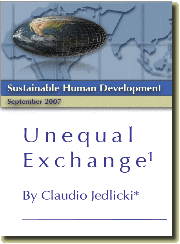
Indeed, in this commercial imperialism labour endowments stand out, which, in a fashion exogenous to the so-called logic of market economies, are established by way of institutional policies. In this way, the author's assertion that the North-South unequal exchange constitutes a very meaningful endowment for the high average living standard of Northern Societies becomes an indisputable argument. To be sure, the South's misery subsidises "the North's good living".
This is why Jedlicki argues that any serious assessment in pursuit of a solution to the North-South's unequal exchange cannot escape this reality. Thus, any re-assessment of the South's exports, with the sustainability of people and planet in mind, forcefully entails rebalancing living standards on both sides, increasing in the South and diminishing in the North.
*Researcher at the Centre de Recherche et de Documentation de l'Amérique Latine (CREDAL), which is part of the Centre National de la Recherche Scientifique (CNRS) of France.
Download our full brief here!
TOP
PPP WAGE GAPS TO 2005 - EUROPEAN AND G7 PURCHASING POWER LOSS RELATIVE TO THE U.S. ONLY SOUTH KOREA AND BRAZIL IMPROVE THEIR REAL WAGES!
PPP WAGE GAPS FOR SELECTED DEVELOPED AND "EMERGING" ECONOMIES FOR MANUFACTURING WORKERS. (Updated from 1975 up to 2005)
In 2004 France, Great Britain, Italy and Spain eliminated or almost closed their wage gaps with the U.S., yet they reopened them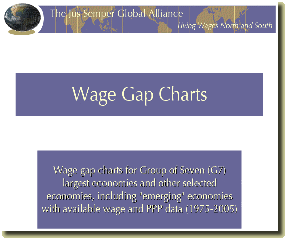 in 2005. This is due to the fact that all European countries included in our annual analysis lost purchasing power by an average of 10,4%. Even Germany reduced significantly its traditional purchasing-power advantage over the U.S. Canada and Japan endured the same trend. Only South Korea and Brazil increased their purchasing power by 5%. In fact, South Korea, for the first time in thirty years, surpassed Japan by having a smaller wage gap than Japan with the U.S. Hong Kong barely improved and Singapore kept losing ground. Mexico, continues fixed with the worst real-wage -with no improvement whatosoever- given that it has the greatest wage gap with the U.S., a dramatic 85%, far worse than Hong Kong's 70%, the next worst gap in 2005. in 2005. This is due to the fact that all European countries included in our annual analysis lost purchasing power by an average of 10,4%. Even Germany reduced significantly its traditional purchasing-power advantage over the U.S. Canada and Japan endured the same trend. Only South Korea and Brazil increased their purchasing power by 5%. In fact, South Korea, for the first time in thirty years, surpassed Japan by having a smaller wage gap than Japan with the U.S. Hong Kong barely improved and Singapore kept losing ground. Mexico, continues fixed with the worst real-wage -with no improvement whatosoever- given that it has the greatest wage gap with the U.S., a dramatic 85%, far worse than Hong Kong's 70%, the next worst gap in 2005.
Workers performing the same or an equivalent job for the same business entity, in the generation of products and services that this entity markets at global prices in the global market, must enjoy an equivalent remuneration. This equivalent remuneration is considered a living wage, which is a human right. A living wage provides workers in the South with the same ability to fulfil their needs, in terms of food, housing, clothing, healthcare, education, transportation, savings and even leisure, as that enjoyed by equivalent workers in the North, which we define in terms of the purchasing power parities (PPP) as defined by the World Bank and the OECD.
The definition of a living wage of The Jus Semper Global Alliance is as follows: A living wage is that which, using the same logic of ILO´s Convention 100, awards "equal pay for work of equal value" between North and South in PPPs terms.
The premise is that workers must earn equal pay for equal work in terms of material quality of life for obvious reasons of social justice but also, and equally important, for reasons of global sustainability.
The argument of an equivalent living wage is anchored on two criteria:
- Article 23 of the UN Universal Declaration of Human Rights, on the following points:
- a. Everyone, without any discrimination, has the right to equal pay for equal work
b. Everyone who works has the right to just and favourable remuneration ensuring for himself and his family an existence worthy of human dignity, and supplemented, if necessary, by other means of social protection.
- ILO´s Convention 100 of "equal pay for work of equal value', which is applied for gender equality, but applied in this case to North-South equality, using PPPs as the mechanism.
The proposal is to make workers in the South earn living wages at par with those of the First World in terms of PPPs in the course of a generation (thirty years). There will not be any real progress in the sustainability of the market system -in all three economic, environmental and social dimensions- if there is no sustained generation of aggregate demand, in that period, through the gradual closing of the wage gap between North and South. This does not mean, whatsoever, that progress should be equivalent to the increase of irrational consumption, depleting all non-renewable resources. Eventually, during the twenty-first Century, a new paradigm must be built in which the purpose of the market is the welfare of all ranks of society, and the privileging of sustainability and not of capitalist accumulation.
Yet, while that stage is reached, there is no justification at all, moral or economical, for the workers of the South not to earn wages equivalent to those of their counterparts in the North, in PPP terms, based on equal pay for equal work of equal market value. Just as the International Labour Organisation's Decent Work Agenda states, the decent work concept has led to an international consensus that productive employment and decent work are key elements to achieving poverty reduction. The blatant and perverse exploitation of workers in the South must be stopped.
The analysis is an update for 12 economies and the U.S., prepared by TJSGA, using 2005 hourly compensation costs for manufacturing workers as reported by the U.S. Department of Labour, and PPP data from the World Bank and the OECD. The report exposes once again a global labour system that profits over the majority of the people in favour of a global elite. Download the pdf file with the wage gap update for 12 economies (Germany, France, Italy, Canada, U.K., Spain, Japan, South Korea, Singapore, Brazil, Hong Kong and Mexico) here.
TOP
MEXICO MAINTAINS THE DUBIOUS HONOUR OF ENDURING THE WORST MANUFACTURING REAL-WAGE PURCHASING POWER -CUSTOMARY AND PREMEDITATED EXPLOITATIVE WAGES - MODERN SLAVE WORK WAGES In 2005, Mexico continues showing the worst real wage -with no improvement- in purchasing power parities (PPPs), for it has the greatest 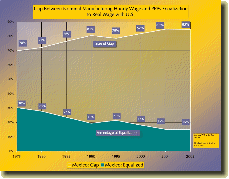 equalized wage gap with the U.S. (85%), when compared against other emerging economies and against eight developed economies. In other words, a Mexican worker earns only 15% of the purchasing power (material quality of life) enjoyed by the equivalent U.S. counterpart, for a product that will be marketed globally at global prices. Even in Brazil's case -the most similar economy with available data- the wage gap is clearly less dramatic (60%) than in the Mexican case. equalized wage gap with the U.S. (85%), when compared against other emerging economies and against eight developed economies. In other words, a Mexican worker earns only 15% of the purchasing power (material quality of life) enjoyed by the equivalent U.S. counterpart, for a product that will be marketed globally at global prices. Even in Brazil's case -the most similar economy with available data- the wage gap is clearly less dramatic (60%) than in the Mexican case.
In the last 30 years, all the G7 nations, Spain and South Korea surpassed, eliminated or, at least, experienced a very significant reduction of their PPP wage gaps equalized with equivalent U.S. jobs. In dramatic contrast, Mexico moved in the opposite direction. That is, in 30 years, Mexico increased its equalization gap from 70% to a dramatic 85% with respect to the U.S. excluding in this way a great part of its population by maintaining a labour market with hunger wages and, in consequence, an absence of generation of aggregate demand.
Beginning with a string of abrupt devaluations since 1976, real wages -relative to their equalization with the U.S. based on PPPs- initiate a constant loss of purchasing power, dropping 50%, between 1975 and 2005, since employers adjust prices but not wages. Beginning with the great financial debacle of 1994 and Mexico's insertion in the North American Free Trade Agreement, wages collapse losing more than ever their purchasing power. From that moment on, prices, relative to the U.S., partially reach in 2005 94% of the 1975 level, increasing the cost of living -in relation to the U.S.- 59% between 1995 and 2005, reaching in 2005 a ratio of 73¢ against $1 dollar in the U.S. (PPP= 73), whilst wages fall 21% (from 19 to 15 index). This generates and keeps generating, through a premeditated and perverse system, an extremely hash impoverishment of the population. Download the pdf file with the analysis of Mexico's wage gap here.
TOP
THE STATE OF BRAZIL'S MANUFACTURING WAGES CONTINUED IMPROVING IN 2005, ALBEIT IT IS STILL CLEARLY NEGATIVE
In 2005 Brazil's manufacturing real wages continued enduring one the largest wage gaps with the U.S. (60%), only less wide than in Singapore, 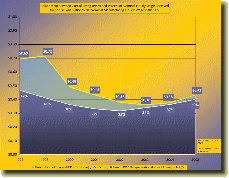 Hong Kong and Mexico; yet with a good improvement over 2004. Since 1996, (first year with manufacturing wage comparable data available) real wages lost 31% up to 2002 -relative to their PPP equalization with the U.S. Prices drop with the 1999 crisis but wages do even more; thus, real wages collapse in the span of six years. The gap between nominal and PPP equalized wage deepens, growing from 53% to 68% between 1996 and 2002. That is, although PPP cost of living drops from 69¢ to 38¢ against $1 in the U.S., between 1996 and 2002, Brazilian PPP purchasing power drops from a 47 to a 32 index. This is due to the fact that employers increase price levels over wage levels. Hong Kong and Mexico; yet with a good improvement over 2004. Since 1996, (first year with manufacturing wage comparable data available) real wages lost 31% up to 2002 -relative to their PPP equalization with the U.S. Prices drop with the 1999 crisis but wages do even more; thus, real wages collapse in the span of six years. The gap between nominal and PPP equalized wage deepens, growing from 53% to 68% between 1996 and 2002. That is, although PPP cost of living drops from 69¢ to 38¢ against $1 in the U.S., between 1996 and 2002, Brazilian PPP purchasing power drops from a 47 to a 32 index. This is due to the fact that employers increase price levels over wage levels.
Nonetheless, in Brazil's case, since 2003 wage equalization shows a consistent improvement, averaging a 7,7% increase annually. Thus, by 2005, with an 8,1% growth in equalization, the cumulated growth since 2002 already reaches 25%. In this way, the equalization index increases from 32 to 40. That is, the real wages gap decreases from 68 to 60%. In contrast with Mexico, a country with similar development, Brazil's gap has not increased as dramatically (PPP equalization of 40 vs. 15 in Mexico in 2005). Yet, the situation in Brazil, after more than two decades of supply-side economics, shows the same overwhelming features of pauperization of workers and their families in favour of employers as in Mexico. Although we are yet to see if the small recovery in the last three years continues or if it retreats, the ground recovered is meaningful and it exhibits even more dramatically the policy of wage pauperisation that has been imposed in Mexico.
Download the pdf file with the analysis of Brazil's wage gap here.
TOP
SPAIN'S WAGE GAP - THE STATE OF MANUFACTURING WAGES IN SPAIN LOSES GROUND IN ITS PPP EQUALIZATION WITH THE U.S, AS A RESULT OF ITS LOSS IN PURCHASING POWER In 2005 Spain suffers a clear loss of 12,3% in wage purchasing power vis-à-vis its U.S. counterparts. This loss occurs in all European countries  (averaging -10,4%), Japan (-3,6%) and Canada (-3.9%). Thus, Spain's real manufacturing wage gap increases from 14 to 23%. This loss of purchasing power of Spanish wages generates a deterioration of its equalization index, moving from 86 to 77. In this way, South Korea, the only country with an increase in its purchasing power (4,9%), takes a better position than Spain and Japan, with an equalization index of 79. (averaging -10,4%), Japan (-3,6%) and Canada (-3.9%). Thus, Spain's real manufacturing wage gap increases from 14 to 23%. This loss of purchasing power of Spanish wages generates a deterioration of its equalization index, moving from 86 to 77. In this way, South Korea, the only country with an increase in its purchasing power (4,9%), takes a better position than Spain and Japan, with an equalization index of 79.
Nonetheless, its situation is in dramatic contrast with Mexico's. In 1975 Mexico and Spain had the same PPP cost-of-living index (78). Although, during the period of thirty years, price levels have been more equalized in Spain than in Mexico (a generally higher cost of living in Spain), relative to the U.S., the insertion of Spain in the European Union and of Mexico in the North American Free Trade Agreement have drawn dramatically different results. The hard facts are that Spain's economic strategy gives sustained support to aggregate demand and Mexico's depresses it. Thus, while nominal manufacturing wages increase seven fold in Spain, in Mexico they grow a meagre 80% -well below the 284% growth of wages in the U.S., its main trading partner. Thus, the Spanish economy joins fully the group of developed economies whilst Mexico retreats into poverty levels that precede, at the very least, the levels prevalent three decades ago.
Download the pdf file with the analysis of Spain's wage gap here.
TOP
TABLE T4*: 1975 - 2005 REAL-WAGE GAPS FOR TWELVE ECONOMIES, IN PURCHASING POWER PARITY (PPP) TERMS, FOR MANUFACTURING WORKERS. *(The base table used for all PPP real-wage gap analysis)
INTERNATIONAL COMPARISONS OF HOURLY COMPENSATION COSTS FOR MANUFACTURING WORKERS BETWEEN THE US AND SELECTED DEVELOPED AND "EMERGING" MARKETS, BARRING SOUTH KOREA, BRAZIL AND HONG KONG, SHOW CLEAR DECLINES IN REAL WAGES (CANADA, EUROPE, JAPAN AND SINGAPORE) AND NO IMPROVEMENT IN MEXICO!
2005 has signalled a change in trends since 2000 in selected European economies, with consistent drops in real 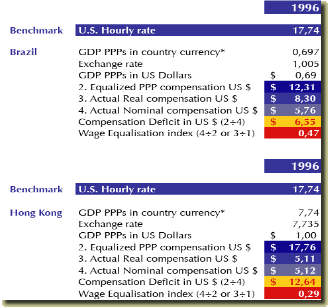 wages and in their corresponding purchasing-power parities (PPPs), using comparable wages in the U.S. as the benchmark. Canada, Japan and Singapore also experienced similar declines whilst Mexico retained the worst real wages of all economies in this assessment. During 2005, a clear contention of real wages was the tone, particularly in the G7 countries. Only South Korea, Hong Kong and Brazil reduced their equalisation wage gaps and increased their real wages. In contrast, Mexico retained the dubious honour of having the worst real-wage gap with the U.S., dramatically below Hong Kong, the next worst gap. wages and in their corresponding purchasing-power parities (PPPs), using comparable wages in the U.S. as the benchmark. Canada, Japan and Singapore also experienced similar declines whilst Mexico retained the worst real wages of all economies in this assessment. During 2005, a clear contention of real wages was the tone, particularly in the G7 countries. Only South Korea, Hong Kong and Brazil reduced their equalisation wage gaps and increased their real wages. In contrast, Mexico retained the dubious honour of having the worst real-wage gap with the U.S., dramatically below Hong Kong, the next worst gap. - The euro area countries included in the analysis (France, Germany, Italy and Spain, plus the UK), experienced marked declines in real wages versus the U.S. in 2005, averaging a drop of 10,4%. The U.K. experienced the lowest decline (7,3%) whilst Spain had the greatest decline (11%).
- In Asia, South Korea and Hong Kong increased their real wages 4,9 and 5,7% respectively, whereas Japan, and Singapore's hourly wages slightly lost value by 1,5 and 0,8% respectively. The major highlight is, however, that South Korea, for the first time in thirty years, has surpassed Japan and has now a smaller wage gap and greater real wages than Japan, relative to comparable U.S. wages.
- In the Americas, Brazil continues to recover ground lost since 2003.Mexico shows no sign of improvement. It is expected that this will worsen even further in the future, given that the nominal minimum wage in 2008 was increased by 4%, which is below real inflation and a 35% increase in the cost of the basic-goods basket during 2007. Canada lost 2,3% in real-wage value and, in PPP terms, it is now nearly at par with equivalent wages in the U.S.
Download the pdf file of Table 4 here.
TOP
RESOURCE CENTRE
CORPORATE DESIGN. THE MISSING BUSINESS AND PUBLIC POLICY ISSUE OF OUR TIME
How can corporations be designed so as to blend social, environmental, and financial mission at their very core? This is the design challenge of the 21st century
Corporation 20/20 is a new multi-stakeholder initiative that seeks to answer this question. Its goal is to develop and disseminate corporate designs  where social purpose moves from the periphery to the heart of future organizations. To this endeavour, this initiative has developed six principles to be followed for corporate redesign: where social purpose moves from the periphery to the heart of future organizations. To this endeavour, this initiative has developed six principles to be followed for corporate redesign: - The purpose of the corporation is to harness private interest to serve the public interest.
- Corporations shall distribute their wealth equitably among those who contribute to its creation.
- Corporations shall accrue fair returns for shareholders, but not at the expense of the legitimate interests of other stakeholders.
- Corporations shall be governed in a manner that is participatory, transparent, ethical, and accountable.
- Corporations shall operate sustainably, meeting the needs of the present generation without compromising the ability of future generations to meet their needs.
- Corporations shall not infringe on the right of natural persons to govern themselves, nor infringe on other universal human rights.
These principles seek to address the imbalance caused by nearly two centuries of legal decisions and corporate practices, which together have expanded the rights of corporations without a commensurate expansion of their obligations. Elaborating on the subject, Corporation 20/20 has just published a report that explores different routes for redesigning the purpose of business, describing the roles that the different stakeholders may adopt towards this objective. The authors, Marjorie Kelly and Allen White, argue that implementing these principles in the 21st century requires the true commitment of business, governments and civil society. Corporate redesign seeks to change the narrow purpose of business inherited from the 19th century: shareholder value, to now place at the same level -as the first principle declares- the responsibility of serving the public good. Why does society allow corporations to exist? To serve the public good. Why do individuals start corporations? To serve their own interests. Effective design knits these two together. In this way, the first principle articulates an emerging social consensus: corporations have social responsibilities, and when those conflict with profit-making, without a doubt, the public good comes first. In sync with Jus Semper's position, the purpose of democratic societies must be the long-term and dignified sustainability of people and planet. The market must only be a mean to this goal and not its end, as it is today. The authors correctly consider that resistance to such changes should not be underestimated. Parties with a vested interest in the status quo will undoubtedly oppose corporate redesign. Yet, from a broader societal perspective, the authors tell us that there is no choice. There is simply no doubt that, as dominant institutions in society, corporations have societal obligations. Thus, shaping future corporate forms to honour these obligations is the design imperative of the 21st century. In this way, the authors conclude their report by further exploring the subject, envisioning the roles that different stakeholders may adopt and illustrating them with case studies of real businesses that were designed with human welfare as their main purpose. Download the report on corporate redesign here!
TOP
PAPER SERIES ON CORPORATE REDESIGN PRESENTED DURING THE SUMMIT OF CORPORATION 20/20
Paper series prepared for distribution at the recent Summit on the Future of the Corporation
This document offers a collection of ten papers exploring key components of corporate design, prepared to set the stage for The Summit on the 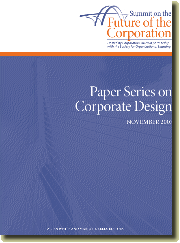 Future of the Corporation. All papers seek to answer this question: What would corporations look like that were designed to seamlessly integrate social purpose into the core of the organisation? Rather than constraining themselves to a debate between government regulation and free markets, these essays explore the design of a new business system: structure, culture, management practice, ownership control, business and investment law, as well as the key role of stakeholders, from consumers to investors. The papers depart from conventional wisdom to foster dialogue and action among an ever-growing circle of citizens who believe that corporations can and must play a pivotal role in achieving a sustainable future. Future of the Corporation. All papers seek to answer this question: What would corporations look like that were designed to seamlessly integrate social purpose into the core of the organisation? Rather than constraining themselves to a debate between government regulation and free markets, these essays explore the design of a new business system: structure, culture, management practice, ownership control, business and investment law, as well as the key role of stakeholders, from consumers to investors. The papers depart from conventional wisdom to foster dialogue and action among an ever-growing circle of citizens who believe that corporations can and must play a pivotal role in achieving a sustainable future.
Download the paper series on corporate redesign here!
TOP
OECD WATCH - THE MODEL NATIONAL CONTACT POINTS (MNCP): PROPOSALS FOR IMPROVING AND HARMONIZING THE PROCEDURES OF THE NATIONAL CONTACT POINTS FOR THE OECD GUIDELINES FOR MULTINATIONAL ENTERPRISES New survey finds governments failing to curb corporate abuse. Thus, unless improvements are made, the OECD Guidelines for Multinational Enterprises -one of the few CSR instruments with some value- will lack credibility
As a response from civil society, OECD Watch has just published its Model National Contact Point (Model NCP) to make recommendations for  increasing the effectiveness of the OECD Guidelines, based on the findings from extensive consultations among government officials, trade unions, business representatives and NGOs in 20 OECD countries. The study found, as could be expected, that almost none of the countries surveyed had properly functioning bodies to deal with formal complaints about violations of the OECD Guidelines. increasing the effectiveness of the OECD Guidelines, based on the findings from extensive consultations among government officials, trade unions, business representatives and NGOs in 20 OECD countries. The study found, as could be expected, that almost none of the countries surveyed had properly functioning bodies to deal with formal complaints about violations of the OECD Guidelines.
In this way, the Model NCP contains proposals and recommendations to improve and harmonise the functioning of the NCPs. Proposals range from basic principles such as the independence of the NCP and equal treatment of parties to detailed recommendations towards better handling of complaints. The study denounces that governments seem to have forgotten that they have an obligation to prevent and punish irresponsible behaviour by their companies, especially when such behaviour leads to human rights violations, whether companies are active in Burma, Jordan, Zimbabwe or Mexico, for governments must act accordingly to stop and punish these abuses.
Hence, OECD Watch calls on OECD member governments to adopt the recommendations contained in the Model National Contact Point and to act accordingly. Nonetheless, naturally, the only way these days to make governments listen and fulfil their responsibilities is when social organisations -both in OECD member governments as well as in host countries of companies from OECD member countries- get involved and exert constant pressure over accountable government institutions. It is indispensable for us to get involved or, otherwise, governments will premeditatedly continue to put deaf ears to corporate malfeasance.
Download the Model NCP here.
TOP
OECD WATCH - THE OECD GUIDELINES AND SOCIALLY RESPONSIBLE INVESTMENT (SRI).
Fact sheets to help investors and SRI agencies better understand the scope of the OECD Guidelines and facilitate their use The OECD Guidelines cover a range of issues, including labour and human rights, bribery and corruption, the environment and information 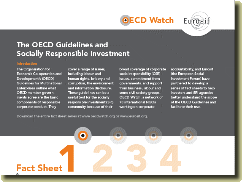 disclosure. These guidelines can be a useful tool for the socially responsible investment (SRI) community because of their broad coverage of corporate social responsibility (CSR) issues, commitment from governments, and support from business, labour and some civil society groups. Therefore, OECD Watch, a network of 78 international NGOs and Eurosif (the European Social Investment Forum) partnered to develop a series of fact sheets to help investors and SRI agencies better understand the scope of the OECD Guidelines and facilitate their use. disclosure. These guidelines can be a useful tool for the socially responsible investment (SRI) community because of their broad coverage of corporate social responsibility (CSR) issues, commitment from governments, and support from business, labour and some civil society groups. Therefore, OECD Watch, a network of 78 international NGOs and Eurosif (the European Social Investment Forum) partnered to develop a series of fact sheets to help investors and SRI agencies better understand the scope of the OECD Guidelines and facilitate their use. Download the four fact sheets here TOP
TOO CLOSE FOR COMFORT
The relationship between the biotech industry and the European Commission
It is no secret that the EU political class has embraced the neoliberal agenda. In food and farming this translates as high-technology intensive farming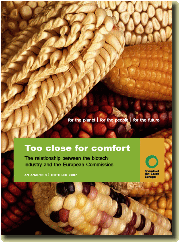 with patented inputs and outputs (pesticides, genetically modified seeds, etc) that generate wealth for European industry. The basic aim, clearly stated in EU policy objectives such at the Lisbon Agenda, is to make Europe a leader in the global economy. with patented inputs and outputs (pesticides, genetically modified seeds, etc) that generate wealth for European industry. The basic aim, clearly stated in EU policy objectives such at the Lisbon Agenda, is to make Europe a leader in the global economy.
This report, from Friends of the Earth Europe, examines one of the results of this political mindset and agenda - that of corporate lobby power and its access to one of the key EU institutions, the European Commission. The study focuses on one of the key biotech lobby groups - EuropaBio - and recent examples of the very cosy relationship between the companies who stand to make considerable profits from agricultural biotechnology, and policy makers at the European Commission.
The report concludes that the doors of the European Commission are wide open to the biotech industry lobby, whilst public opposition to GM food and crops are completely ignored and overruled as the EU's administrative body promotes an application of a new technology that will only benefit a handful of very large multinational corporations. Not exactly a shining example of public service and democracy.
Hence, the report makes three recommendations: 1. Legislation to reign in the power of corporate lobbying power 2. The EU Biotech Strategy should be revised to acknowledge the failure of GM food and crops 3. EU research priorities and funding should focus on ecologically compatible farming schemes Download the pdf of the full document here.
TOP
HUMAN DEVELOPMENT REPORT 2007/2008. FIGHTING CLIMATE CHANGE: HUMAN SOLIDARITY IN A DIVIDED WORLD. THE HDR 2007/08 SAYS THAT CLIMATE CHANGE THREATENS WITH SETBACKS IN HUMAN DEVELOPMENT WITHOUT PRECEDENT IN THE REDUCTION OF POVERTY, NUTRITION, HEALTH AND EDUCATION What we do today about climate change has consequences that will last a century or more. The part of that change that is due to greenhouse 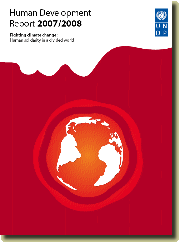 gas emissions is not reversible in the foreseeable future. The heat trapping gases we send into the atmosphere in 2008 will stay there until 2108 and beyond. We are therefore making choices today that will affect our own lives, but even more so the lives of our children and grandchildren. This makes climate change different and more difficult than other policy challenges gas emissions is not reversible in the foreseeable future. The heat trapping gases we send into the atmosphere in 2008 will stay there until 2108 and beyond. We are therefore making choices today that will affect our own lives, but even more so the lives of our children and grandchildren. This makes climate change different and more difficult than other policy challenges
For those willing to listen instead of putting deaf ears, the prognosis and the call of Kemal Dervi and Achim Steiner, the people responsible for the HDR 2007/08 will not surprise them, for they are already conscientious and they are taking action accordingly. For those refusing to accept the evident environmental decay, will suffer anyway the same consequences, few or many, for the planet does not make distinctions between conscientious people and their antipodes. Thus, they have nothing to lose by acknowledging what surely will occur to all in some measure; and instead, if they get involved, we will all have much to gain.
The United Nations Human Development Programme officers confirm to us that climate change is now a scientifically established fact. The exact impact of greenhouse gas emission is not easy to forecast and there is a lot of uncertainty in the science when it comes to predictive capability. But we now know enough to recognise that there are large risks, potentially catastrophic ones, including the melting of ice-sheets in Greenland and the West Antarctic (which would place many countries under water) and changes in the course of the Gulf Stream that would bring about drastic climatic changes.
Hence, Dervi and Steiner argue that prudence and care about the future of our children and their children requires that we act now. This is a form of insurance against possibly very large losses. The fact that we do not know the probability of such losses or their likely exact timing is not a valid argument. We know the danger exists. We know the damage caused by greenhouse gas emissions is irreversible for a long time. We know it is growing with every day of inaction. For these reasons, and for a basic instinct of survival, we all have to act, changing our consumer habits and lifestyles in a rather significant manner.
The report includes a large collection of statistical reports and data sets, including the annual Human Development Index.
Download directly from the UNDP website here or in French here
Visit the UNDP Human Development Report website here.
Or, if the urls do not respond, download the pdf of the full report here or the French version here. TOP
CIVIL SOCIETY'S 2008 CALENDAR - Civil Society Consultations on World Food Security and the Challenges of Climate Change and Bioenergy. Rome, Italy 15 - 16 February 2008. Read more
- The 9th Global Civil Society Forum, prior to the 10th Special Session of the Governing Council/Global Ministerial Environment Forum, Monaco, Monaco. 19 February 2008. Read more
- 3rd Global Youth Conference on Democracy & Political Participation, Lagos, Nigeria 20-22 February 2008. Read more
- Global Warming and Climate Change 2008, London, UK. 22-25 February 2008. Read more
- Climate Change and Biodiversity in the Americas, Toronto, Canada. 25-29 February 2008. Read more
- 2nd ASEAN Economic and Business Student Summit 2008. Jakarta, Indonesia. 28 February - 1 March 2008. Read more
- International Conference on Integrated Water Resources Management. Cape Town, South Africa. 10-12 March 2008. Read more
- Social Business and Microeconomic Opportunities for Youth. Denver, U.S. 12-14 March 2008. Read more
- World Water Day. Geneva, Switzerland. 20 March 2008. Read more
- Humanist European Forum. Milan, Italy. 4-6 April 2008. Read more
- Earth Day 2008. Washington, D.C., U.S. 20 April 2008. Read more
- CERES Conference 2008: Building Leadership, Creating Solutions. Boston, U.S. 29-30 April 2008. Read more
- The Art and Science of Impact Assessment 27th Annual Conference of IAIA. Perth, Australia. 4-10 May 2008. Read more
- World Environment Day. Wellington, New Zealand. 5 June 2008. Read more
- Human Rights Watch International Film Festival: Youth Producing Change. New York, U.S. 9-16 June 2008. Read more
- Expo Zaragoza 2008- Water and Sustainable Development. Zaragoza, Spain. 14 June - 11 September 2008. Read more
- CIVICUS Youth Assembly. Glasgow, Scotland. 16-18 June 2008. Read more
- CIVICUS World Assembly Acting Together for a Just World, Glasgow, Scotland. 16-18 June 2008. Read more
- Venezuela: Human Rights Delegation for Young Leaders. Caracas, Venezuela. 26 July - 17 August 2008. Read more
- 4th World Youth Congress. Quebec, Canada.10-21 August 2008. Read more
- Missing Women: Decolonisation, Third Wave Feminism and Indigenous People of Canada and Mexico. Regina, Canada. 14-17 August 2008. Read more
- 7th International Conference on Corporate Social Responsibility. Durham, UK. 3-5 September 2008. Read more
- Seventh Global Conference on Human Development: Unlocking the Potential to Create a New World Together. Atami, Japan.11-15 November 2008. Read more
- Buy Nothing Day. Worldwide. 27 November 2008. Read more
TOP
CORPORATE 2008 CALENDAR
- 3rd Global Conference on Social Responsibility. Dom Pedro Golf, Portugal. 15-17 February 2008. Read more
- FAO: Global perspectives on food and fuel security. Rome, Italy. 18-20 February 2008. Read more
- Global Compact: Raising the Bar: Leading Sustainable Business in 2008. Sidney, Australia. 20 February 2008. Read more
- 10th Special Session of the Governing Council / Global Ministerial Environment Forum. Monaco, Monaco. 20-22 February 2008. Read more
- 2008 Berlin International Conference on the Human Dimensions of Global Environmental Change. Berlin, Germany. 22-23 February 2008. Read more
- Leadership Conference on Global Corporate Citizenship. New York, U.S. 26-27 February 2008. Read more
- The Global Corporate Responsibility Reporting Summit 2008. Berlin, Germany. 3-4 March 2008. Read more
- Business and Human Rights workshop. Melbourne, Australia. 5 March 2008. Read more
- Ethical Sourcing Forum North America 2008. New York, U.S. 13-14 March 2008. Read more
- Corporate Responsibility 2008 - Sustaining Momentum and Responsible Growth. London, UK. 13-14 March 2008. Read more
- 2008 International Corporate Citizenship Conference. Boston, U.S. 6-8 April 2008. Read more
- World Economic Forum on Latin America 2008. Cancun, Mexico. 15-16 April 2008. Read more
- Twelfth session of the United Nations Conference on Trade and Development (UNCTAD XII). Accra, Ghana. 20-25 April 2008. Read more
- Global Compact: US Network Conference: Business and Human Rights. Boston, U.S. 28 April 2008. Read more
- 16th session of the UN Commission on Sustainable Development. New York, U.S. 5-6 May 2008. Read more
- The Amsterdam Global Conference on Sustainability and Transparency. Amsterdam, Netherlands. 7-9 May 2008. Read more
- Global Compact: Human Rights Working Group Meeting. Amsterdam, Netherlands. 9 May 2008. Read more
- Responsible Business Summit. London, UK. 13-14 May 2008. Read more
- ILO's 97th International Labour Conference . Geneva, Switzerland. 28 May- 13 June 2008. Read more
- Triple Bottom Line Asia Conference 2008 - FAST-TRACKING Environmental and Social Governance. Bangkok, Thailand. 29-30 May 2008. Read more
- OECD Forum 2008 - Climate Change, Growth, Stability. Paris, France. 3-4 June 2008. Read more
- High-Level Conference on World Food Security and the Challenges of Climate Change and Bioenergy. Rome, Italy 3-5 June 2008. Read more
- International Economic Forum of the Americas. Montreal, Canada. 9-12 June 2008. Read more
- Business and Sustainable Development Conference. Washington, D.C., U.S. 12-13 June 2008. Read more
- Corporate Social Responsibility. Dubai, United Arab Emirates. 15-19 June 2008. Read more
- Climate Change 2008 - A New Climate Deal?: the EU, the USA and the developing world. London, UK . 16-17 June 2008. Read more
- Global Compact: Principles for Responsible Investment Annual Meeting. Seoul, South Korea. 17-18 June 2008. Read more
- G8 Summit. Hokkaido, Japan. 7-9 July 2008. Read more
- 2008 World Water Week. Stockholm, Sweden. 17-23 August 2008. Read more
- World Agricultural Forum: 2008 African Congress. Kampala, Uganda. 3-5 September 2008. Read more
- 2008 Meetings of the World Bank Group and the International Monetary Fund. Washington, D.C., U.S. 13 October 2008. Read more
- Trade-Related Issues: Are labour standards and environmental agreements the new protectionism or do they make globalisation more palatable? London, UK. 20-22 October 2008. Read more
- SRI (Socially Responsible Investment) Annual Conference. Whistler, Canada. 26-29 October 2008. Read more
- CSR Asia Summit 2008. Bangkok, Thailand. 3-4 November 2008. Read more
- Business for Social Responsibility Annual Conference . New York, U.S. 4-7 November 2008. Read more
- Triple Bottom Line Europe Conference 2008 - FAST-TRACKING Environmental and Social Governance. Amsterdam, Netherlands. 13-14 November 2008. Read more
- United Nations Climate Change Conference. Poznan, Poland. 1 - 12 December 2008. Read more
TOP
2007 TOP-TWENTY RESOURCE DOWNLOADS
Following is the chart with the top ten internal and external information resources downloaded from our website in 2007. Below the chart are the links for each of the top-twenty resources if you want to download them:
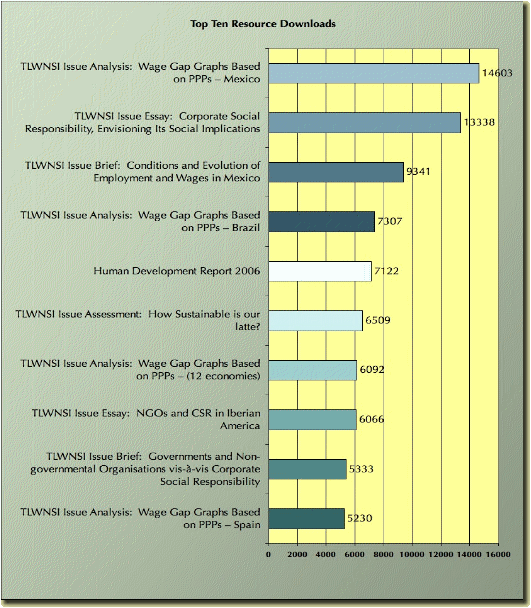
To download click below for the top-twenty downloads in 2007:
1. TLWNSI Issue Analysis: Wage Gap Graphs Based on PPPs - Mexico
2. TLWNSI Issue Essay: Corporate Social Responsibility, Envisioning Its Social Implications
3. TLWNSI Issue Brief: Conditions and Evolution of Employment and Wages in Mexico
4. TLWNSI Issue Analysis: Wage Gap Graphs Based on PPPs - Brazil
5. Human Development Report 2006
6. TLWNSI Issue Assessment: How Sustainable is our latte?
7. TLWNSI Issue Analysis: Wage Gap Graphs Based on PPPs - (12 economies)
8. TLWNSI Issue Essay: NGOs and CSR in Iberian America
9. TLWNSI Issue Brief: Governments and NGOs vis-à-vis Corporate Social Responsibility
10. TLWNSI Issue Analysis: Wage Gap Graphs Based on PPPs - Spain
11. TLWNSI Issue Essay: The Neo- Capitalist Assault in Mexico
12. TLWNSI Issue Commentary: Wal-mart Mexico Merrily Avoids Awkward Questions
13. Promoting a European Framework for CSR. Green Book (2001)
14. TLWNSY Issue Analysis T4: Wage Gap - International comparisons of hourly compensation costs PPP (12 economies)
15. TLWNSI Issue Brief: CSR Included Aspects and Relevant Exclusions. Minimum Norms for the Mexican Ethos
16. TLWNSI Issue Essay: Consumer Power in the Logic of the Market
17. TLWNSI Issue Essay: The Future of CSR Will Mirror the State of Society
18. TLWNSI Issue Brief: Corporate Social Responsibility Still an Infant Discipline
19. TLWNSI Issue Essay: Living Wages: The Missing Link of the GRI
20. TLWNSI Issue Commentary: California's Supermarket Strike. CSR Nowhere to be Found. Commentary on its conclusion: California's Supermarket Strike: National Grocers Trash any Trace of Corporate Social Responsibility. TLWNSI Issue Brief: New California's supermarket agreement with workers in 2007
TOP
A FINAL THOUGHT A living wage is, universally, the most important element in the achievement of everyone´s right to a dignified life and the eradication of poverty. Relative to the social responsibility of business, a corporation or organisational entity employing people, regardless of size or trade, public or private, cannot be considered to behave in a socially responsible manner if it does not pay a living wage, regardless of how responsibly it behaves in all other areas of activity. 
Mexico City policeman chains himself to the main doors
of the City Assembly in protest because his salary does not
make a living wage (19 December 2006).
Just as the International Labour Organisation's Decent Work Agenda states, the decent work concept has led to an international consensus that productive employment and decent work are key elements to achieving poverty reduction. Yet, everything remains in the realm of rhetoric and hypocrisy, and the system, imbued in the most perverse human instincts, remains.
Thank you so much for your support. If you have any questions or comments, Please e-mail us: gsc@jussemper.org
If you are not a member of our eCommunity yet, please click here to sign up for TJSGA's eCommunity to receive our quarterly newsletter. If you do not wish to continue receiving our quarterly newsletter, just e-mail us writing in the subject "unsubscribe" nosuscrip@jussemper.org.
TOP |  |






















